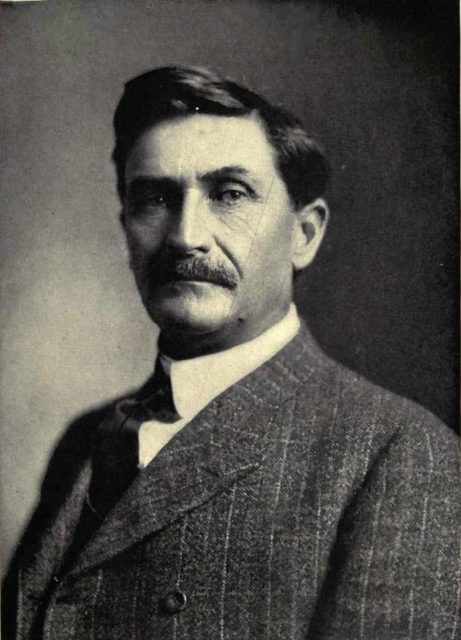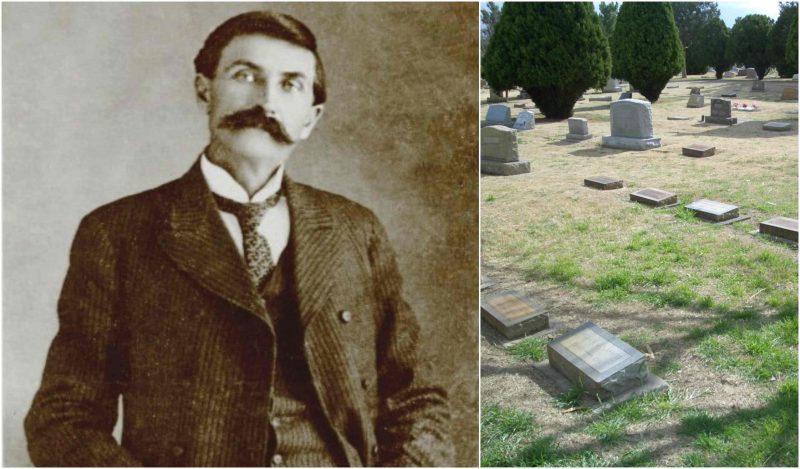Sheriff Pat Garrett earned himself a place in the annals of American history when in 1881 he shot and killed one of the most notorious outlaws of the Old West, Henry “Billy the Kid” McCarty.
Many are familiar with the story of how Sheriff Garrett tracked the Kid, a wanted man, to Fort Sumner, New Mexico, and shot him dead on July 14, 1881, but few people know that 27 years later, Sheriff Garrett was himself murdered in the desert in Doña Ana County, New Mexico.
The great number of unsolved mysteries is part of what makes the Old West so interesting, and one such mystery is the murder of Pat Garrett when he was supposedly unarmed. There have been many rumors and speculations concerning Garrett’s death. A ranch hand named Jesse Wayne Brazel who was traveling with Garrett and had a financial dispute with him confessed to the crime and was put on trial for it, but acquitted. Since then some historians have doubted that it was Brazel who committed the murder. Intricate conspiracies have been discussed.

Garrett worked in law enforcement, and no doubt made many enemies; his life was under constant threat. He achieved national fame for shooting Billy the Kid and was a friend of John Nance Garner, a man who was elected vice-president of the United States. Garrett was appointed to the office of Texas customs agent in 1901 by President Theodore Roosevelt. But some people had serious run-ins with Garrett, and he did not always instill respect. “Garrett gambled, was often profane in speech, and frequently consorted with saloon-keepers and prostitutes,” wrote Leon Claire Metz in his book Pat Garrett: The Story of a Western Lawman.
Garrett was a controversial man then, and he remained one.
However, a 109-year-old document discovered inside a box of never-filed records by a county clerk’s office employee in Doña Ana County sheds some light on matters.
Behold, #PatGarrett‘s coronary report. Mystery solved! @abc7breaking pic.twitter.com/LdtyB2OLMU
— Kate Bieri KVIA (@KateBieriKVIA) June 16, 2017
The document was discovered last year, but it was kept secret for months before being presented to the public for the first time on June 16th. The coroner’s report, written in cursive script and signed by six men, refers to the investigation of Garrett’s death.
As reported by Las Cruces Sun-News, Susannah Garrett, Pat Garrett’s granddaughter, heard about the ceremony from friends and traveled from Santa Fe, New Mexico, just to be present at the unveiling of the document. “Finding the document was an amazing miracle, really. It’s very powerful,” Garrett’s granddaughter said.
Pat Garrett Historical Dona Ana County Documents to be revealed pic.twitter.com/PFhgCAIS2c
— KFOX14 Photogs (@KFOX14Photogs) June 16, 2017
The coroner jury’s report, dated July 9, 1908, reads:
“We the undersigned Justices of the Peace and Coroners Jury have attended the investigation of the body of Pat Garrett who was reported dead within the limits of Precinct No. 20, County of Doña Ana, territory of New Mexico on about five miles northeast of the town of Las Cruces and find that the deceased came to his death by gunshot wounds inflicted by one Wayne Brazel.”
KVIA reports that Arizona State University Professor Emeritus Dr. Bob Stahl, who addressed the audience at the ceremony, said that the coroner’s report is very sparse in detail. For example, it didn’t include that Garrett was unarmed at the time and was probably murdered while he was urinating.
Amy Buesing and Nancy Ann Warner also attended the ceremony after they discovered that their great-great uncle, Vincent May, was a member of the coroner’s jury and signed the document.
On Tuesday, June 13, 2017, Doña Ana County commissioners declared June 16 as “Pat Garrett Day” in honor of the document’s unveiling.
Here at the unveiling ceremony for Old West lawman Pat Garrett’s coroner’s report. People looking at other historical county records. pic.twitter.com/e9kYiBijdI
— Diana Alba Soular (@AlbaSoular) June 16, 2017
The coroner jury’s report of Sheriff Pat Garrett is not the only historical document in the possession of the clerk’s office and according to Las Cruces Sun-News, there are many others, including some dating back to the 1800s.
The project to preserve the historical documents of the clerk’s office started about a year ago and the employees worked patiently, reading each of the documents and labeling them with a sticky note to make it easier for those interested in examining the records.
